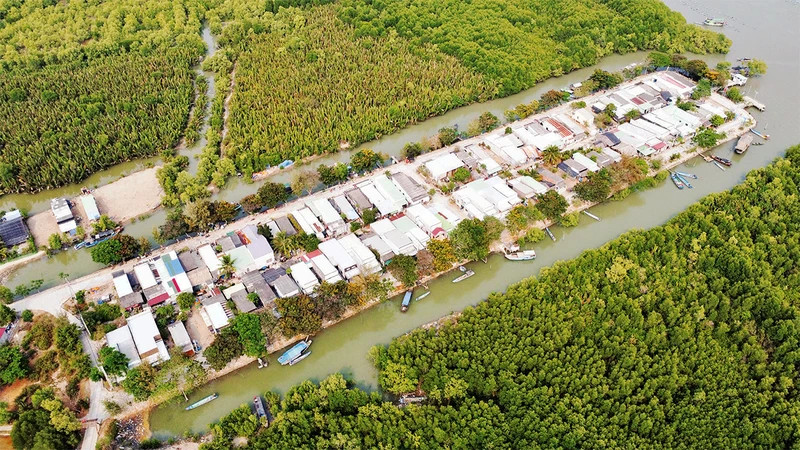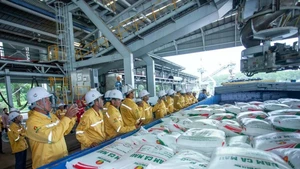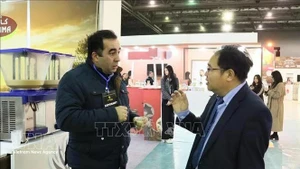Experts on carbon credit needed
In 2023, Vietnam marked a significant milestone by successfully transferring over 10 million carbon credits, generating more than 50 million USD. This achievement has laid the foundation for various organisations, individuals, and localities to take an interest in the highly potential carbon credit market. Alongside the government's efforts to complete the legal framework for the carbon credit market, the training and development of human resources for this field has been also being prioritised in provinces and cities.
Cao Tung Son, Director of the Resource and Environmental Monitoring Centre under the Ho Chi Minh City Department of Natural Resources and Environment, stated that in response to the strong global shift towards a green economy, there is an increasingly urgent need for highly specialised human resources in the field of carbon emission reduction in Ho Chi Minh City. To achieve its ambitious goals in emission reduction and sustainable development, the city needs experts in areas such as emission assessment and reporting, energy management, emission reduction technologies, green finance, and policy and legislation.
According to Cao Tung Son, Ho Chi Minh City is currently facing the impacts of climate change, including rising temperatures, changes in rainfall patterns, flooding, and sea-level rise. Moreover, the city needs to address challenges such as the substantial demand for financial, technological, and human resources to implement low-carbon action plans and objectives. Therefore, the training of human resources for low-carbon emissions is an urgent strategic task.
"By investing in human resources, we not only contribute to reducing carbon emissions but also promote the transition to a green and sustainable economy," said Son. Currently, Ho Chi Minh City has approximately 60 projects related to carbon credits. To participate actively and sustainably, Son has proposed that focus be placed on raising public awareness through an official network of trained communicators, with direct training provided by the Resource and Environmental Monitoring Centre.
Dr. Le Hoang The, Director of Vos Holdings Ecosystem Co., Ltd., noted that Vietnam plans to pilot a carbon credit trading floor by 2025. Therefore, there is a need for a workforce capable of performing the techniques required for exploration, negotiation, and trading. Initially, about 150,000 professional workers need to be trained.
This workforce should be equipped with in-depth knowledge of validation mechanisms, the preparation of related documents, and the assessment and declaration of various types of carbon credits. Among these, training carbon validators with international expertise and certification is a crucial link that will help Vietnam in operating its carbon credit market effectively.
Training High-Quality Human Resources
Vietnam is one of the countries with significant potential in providing carbon credits. The forestry sector alone can supply 57 million carbon credits, equivalent to 52 million tonnes of CO2, which can be sold to international organisations. With diverse terrain spanning 16 degrees of latitude, Vietnam not only possesses a substantial carbon credit reserve but also has the potential to develop ultra-premium carbon credits, known as organic carbon.
However, to develop this market, it is essential to train high-quality human resources. Professor Vo Xuan Vinh, Director of the Institute of Business Research at the University of Economics Ho Chi Minh City, noted that the establishment and implementation of a carbon market could bring substantial benefits and revenue to Vietnam. Participation in the carbon credit market requires effective communication and human resource development based on the principle that "to achieve green development, humans must be at the centre.” This includes training and enhancing the skills of human resources and experts to systematically carry out tasks from measurement and reporting to verification.
"In addition to training programmes, training and research institutes need to strive to join international training networks on carbon credits, aiming to support the government in implementing policies, commitments, and green growth roadmaps," noted Professor Vo Xuan Vinh.
Recently, representatives from the Institute for Public Policy and Rural Development, Intertek Vietnam Co., Ltd., and Vos Holdings Ecosystem Co., Ltd., signed a memorandum of understanding for cooperation in training human resources for the carbon credit market. These courses are designed to equip learners with practical knowledge and skills, thus enabling them to confidently engage in this highly promising market.
Through the training system established by the three parties, many individuals will gain essential knowledge about carbon credits, thereby enhancing the capacity of the labour market in the carbon sector. Dr. Nguyen Trung Dong, Party Secretary and Principal of the Institute for Public Policy and Rural Development (in Ho Chi Minh City), said: "In the carbon credit market, each industry and field has its own specific characteristics. Therefore, it is crucial to train and improve understanding of the carbon absorption and reduction capabilities of different types of crops." As a training and capacity-building institution under the Ministry of Agriculture and Rural Development, the Institute for Public Policy and Rural Development has continuously conducted training activities for businesses and collaborated with partners to organise many classes that help students access concepts related to greenhouse gas emission reductions in both the industrial and agricultural sectors.
With the collective efforts of society, Vietnam is on track to achieve its goal of carbon neutrality by 2050 and move towards a sustainable future, contributing to the protection of the planet for future generations.
















